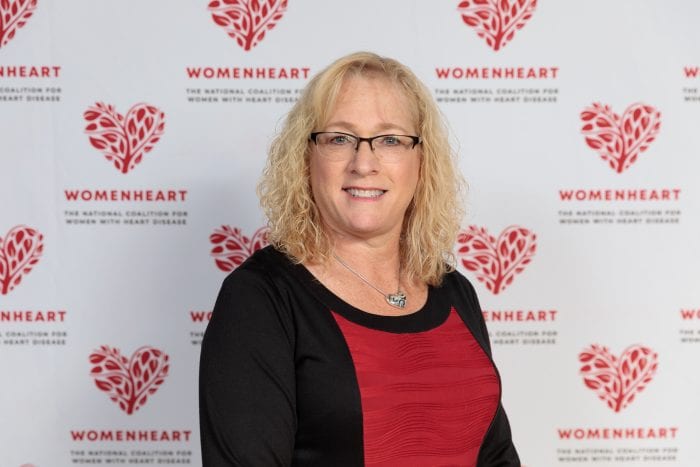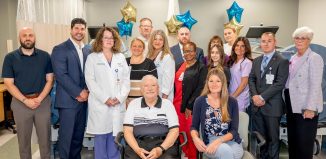Miller Place woman shares her heart health story
To commemorate American Heart Month, February is dedicated to heart disease research and heart health care. Dawn Blatt, a resident of Miller Place, had a heart attack on Feb. 20, 2012, while on vacation with her family and chooses to share her story.
While in California, she began feeling chest pressure that lasted about 20 minutes and eventually went away. She thought it was nothing, and didn’t want to say anything or ruin the trip.
“About two hours later, when we were sitting in the hotel, that chest pressure came back and actually got worse,” she said. “I started getting pain down my left arm, the chest pressure turned to some pain. I was feeling anxious.”
Blatt knew something was going on and she had to act on it. She was getting ready to head into the elevator to catch a ride to the hospital in a city she didn’t know when her husband called 911.
The paramedics did vitals and were talking about EKG changes in her hotel room. Blatt, a physical therapist, heard terms that are usually said to her patients — not typically to her.
The then 46-year-old was taken by ambulance to the hospital and after talking with a doctor, he said that she did indeed have a heart attack.
“That sense of denial that I was having the whole time even though I knew what the symptoms would correlate to was still a shock for me to hear those words,” she said. “And everybody that came in to the room kept saying, ‘Oh, you’re so young!’ and that really got me angry after a while because obviously I wasn’t too young — I had a heart attack.”
The mother of two did not have previous signs or symptoms. She didn’t have the risk factors that would lead people to think she would have a heart attack. Blatt said she was always on the treadmill and was an active person.
“The recovery was physically and emotionally challenging for me,” she said.
In California, to address her cardiac catheterization, one stent was put in her left anterior descending artery in her heart during 1st cardiac catheterization, and four more were added when she came home to New York.
Nearly nine years after the heart attack, Blatt now has no restrictions or limitations.
“I feel like I was lucky,” she said. “But since then, I have started to learn about the fact that so many women are not aware of risk factors, or that the signs of a heart attack can be different for women, especially.”
So, she’s using her voice to talk to others and build a supportive community for people who’ve have been through similar situations. An active member of the national organization WomenHeart, she’s there for other women who have dealt with heart problems big and small.
“The women that I have met through WomenHeart are my heart sisters, and they’re the people that get it,” she said. “It’s so helpful to be able to ask questions of people who’ve been through similar experiences, and that can help give you support or ask questions. That’s why I have decided to help spread the word, raise awareness and support other women living with heart disease.”
Blatt added that sharing her story with others not only gives them someone they can relate to, but is a healing experience for her, as well.
According to Blatt, she has learned a lot of facts about heart health from the nonprofit. WomenHeart has a directory of scientific data, links, an advisory panel of doctors and researchers throughout the country, and is trustworthy and credible.
She said, for women specifically, it’s important to know that heart disease is the leading cause of death for women and there are plenty of signs to know when something wrong is happening.
“A lot of people think, ‘Younger women don’t have heart attacks, they don’t have heart disease,’ but I’ve met so many women in their 20s, 30s and 40s with various forms of heart disease,” she said. “It’s not just an old man’s disease anymore — it’s affecting women.”
Blatt said there’s more to a heart attack then pressure pain in the left arm, and it’s not “just an anxiety attack.”
“Pay attention, seek medical attention, seek medical care, get answers to your signs and symptoms, and if you’re not happy with what they’re telling you, get a second opinion,” she said. “When women go to the ER, if they think they’re having a heart attack, use the words ‘I think I’m having a heart attack.’ That will get you in, otherwise you’re going to be waiting. When you’re having a heart attack, the quicker you get in and get treated, the less damage you can have.”
Friday, Feb. 5, is National Wear Red Day. Everyone is encouraged to wear red and raise support for American heart health.







